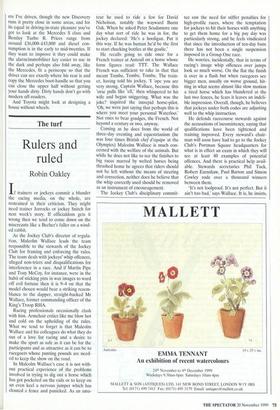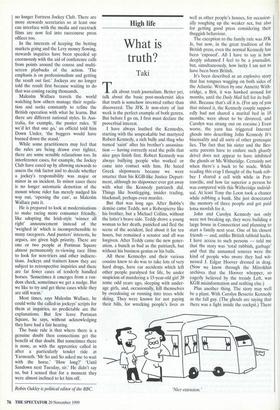The turf
Rulers and ruled
Robin Oakley
If trainers or jockeys commit a blunder the racing media, on the whole, are restrained in their criticism. They might need trainer Jorrocks or jockey Snitch for next week's story. If officialdom gets it wrong then we tend to come down on the miscreants like a Becher's faller on a wind- ed rabbit.
As the Jockey Club's director of regula- tion, Malcolm Wallace leads the team responsible to the stewards of the Jockey Club for framing and enforcing the rules. The team deals with jockeys' whip offences, alleged non-triers and disqualifications for interference in a race. And if Martin Pipe and Tony McCoy, for instance, were in the habit of sticking pins in wax images to ward off evil fortune then it is 9-4 on that the model chosen would bear a striking resem- blance to the dapper, straight-backed Mr Wallace, former commanding officer of the King's Troop RHA.
Racing professionals occasionally clash with him. Armchair critics like me blow hot and cold on the upholding of the rules. What we tend to forget is that Malcolm Wallace and his colleagues do what they do out of a love for racing and a desire to make the sport as safe as it can be for the participants and as attractive as it can be to racegoers whose punting pounds are need- ed to keep the show on the road.
In Malcolm Wallace's case it is not with- out practical experience of the problems involved in trying to dig out a horse which has got pocketed on the rails or to keep on an even keel a nervous jumper which has clouted a fence and panicked. As an ama-
teur he used to ride a few for David Nicholson, notably the wayward Burnt Oak. When he asked Peter Scudamore one day what sort of ride he was in for, the jockey declared: 'He's a hooligan. Put it this way. If he was human he'd be the first to start chucking bottles at the goalie.'
He recalls going to ride once for a French trainer at Auteuil on a horse whose form figures read: 7TT. The Wallace French was sufficient to take in that that meant Tombe, Tombe, Tombe. The train- er, having told his jockey, 'I 'ope you are very strong, Captain Wallace, because this 'orse pulls like 'ell,' then whispered to his wife and began sniggering. What was the joke? inquired the intrepid horse-pilot. 'Oh, we were just saying that perhaps this is where you meet your personal Waterloo.' Not ones to bear grudges, the French. Not beyond a century or two, anyway.
Coming as he does from the world of three-day eventing and equestrianism (he was four times British chef d'equipe at the Olympics) Malcolm Wallace is much con- cerned with the welfare of the animals. But while he does not like to see the finishes to big races marred by welted horses being thrashed home he agrees that riders should not be left without the means of steering and correction, neither does he believe that the whip correctly used should be removed as an instrument of encouragement.
The Jockey Club's disciplinary commit-
tee saw the need for stiffer penalties for high-profile races, where the temptation for jockeys to hit their horses with anything to get them home for a big pay day was particularly strong, and he feels vindicated that since the introduction of ten-day bans there has not been a single suspension imposed in a Group One race.
He worries, incidentally, that in terms of racing's image whip offences over jumps look so much worse. On the flat the finish is over in a flash but when racegoers see bigger men, usually on worse, ground, hit- ting in what seems almost like slow motion a tired horse which has blundered at the last two fences, he fears it leaves an indeli- ble impression. Overall, though, he believes that jockeys under both codes are adjusting well to the whip instruction.
He defends racecourse stewards against the accusations of inconsistency, saying that qualifications have been tightened and training improved. Every steward's chair- man will soon have had to go to the Jockey Club's Portman Square headquarters for what is in effect an exam in which they will see at least 40 examples of potential offences. And there is practical help avail- able. Stewards secretaries Phil Tuck, Robert Earnshaw, Paul Barton and Simon Cowley rode over a thousand winners between them.
'It's not foolproof. It's not perfect. But it ain't too bad,' says Wallace. It is, he insists, no longer Fortress Jockey Club. There are more stewards secretaries so at least one can interface with the media and racetrack films are now fed into racecourse press offices too.
In the interests of keeping the betting markets going and the Levy money flowing, stewards inquiries have been speeded up enormously with the aid of conference calls from points around the course and multi- screen playbacks of the action. 'The emphasis is on professionalism and getting the result out fast.' Jockeys are no longer told the result first because waiting to do that was costing racing thousands.
Malcolm Wallace travels the world watching how others manage their regula- tion and seeks constantly to refine the British operation with what he learns. But there are different national styles. In Aus- tralia, for example, the punter rules. 'If we'd let that one go,' an official told him Down Under, 'the buggers would have burned down the stand.'
While some practitioners may feel that the rules are being drawn ever tighter, there are some sensible relaxations too. In interference cases, for example, the Jockey Club have eased up by allowing stewards to assess the risk factor and to decide whether a jockey's responsibility was major or minor in an incident. In minor cases there is no longer automatic demotion of the mount whose rider has merely nudged his way out, 'opening the can', as Malcolm Wallace puts it.
He is prepared to look at modernisations to make racing more consumer friendly, like adopting the Irish-style 'winner all right' announcement instead of the 'weighed in' which is incomprehensible to many racegoers. And punters' interests, he argues, are given high priority. There are one or two people at Portman Square almost permanently re-viewing race films to look for non-triers and other indiscre- tions. Jockeys and trainers know they are subject to retrospective inquiries and there are far fewer cases of tenderly handled horses. 'Sometimes it emerges from a ran- dom check, sometimes we get a nudge. But we like to try and get these cases while they are still warm.'
Most times, says Malcolm Wallace, he could write the called-in jockeys' scripts for them at inquiries, so predictable are the explanations. But few leave Portman Square, he says, without acknowledging they have had a fair hearing.
The basic rule is that where there is a genuine doubt then connections get the benefit of that doubt. But sometimes there is none, as with the apprentice called in after a particularly tender ride at Yarmouth. `Mr So and So asked me to wait with the horse.' How long?' Until Sandown next Tuesday, sir.' He didn't say so, but I sensed that for a moment they were almost inclined to let him off.
Robin Oakley is political editor of the BBC.



























































































 Previous page
Previous page